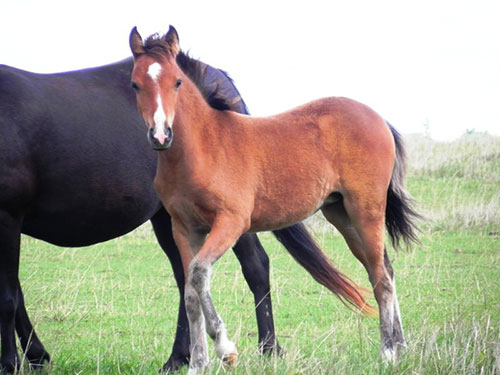
by Jackie Bellamy-Zions, Equine Guelph
The foal’s gut undergoes many changes as it develops rapidly. More and more, we are learning how the colonization of a gut correlates to good health. Exploring the differences in foal microbiomes and how those differences may tie in with overall health has PhD Candidate, Jennifer MacNicol, very excited about the potential advancements the research could yield in the field of equine neonatal care.
MacNicol, from the Department of Animal Bioscience at the Ontario Agricultural College will be working under the direction of Ontario Veterinary College researcher, Dr. Luis Arroyo, in a project planned to begin this summer studying mare/foal pairs to gain knowledge of how the horse’s gut environment matures. Research in genomics is rapidly expanding our knowledge of digestive health but is it is not well understood why diarrhea can become life-threatening in some foals while others recover without additional symptoms.
By studying both microbial and metabolic data the team aims to learn what biomarkers denote health and which could signal a red flag as the gut becomes colonized. The team hopes to compare deviations in health that occur during critical bouts of diarrhea and use the understanding of gut microbial developments in foals to move towards personalized treatments and therapeutics.
“What we want to look at is the development of the GI microbiome along with the metabolome. With the metabolome, we're going to be looking at the by-products of microbial activity in the gut of foals and how that begins to mimic or develop so that it's similar to that of the mare,” explains MacNicol. “Then what we want to see in our subset (foals that develop diarrhea) is whether that microbiome or the metabolome differ from the mare substantially compared to our healthy set.”
In the video, MacNicol begins to describe the complexities of the equine microbial environment that begins to develop at birth, how it very quickly starts to reflect that of the mare and how rapidly a foal adapts so it can consume forage.
“There's often a transient self-limiting diarrhea in healthy foals,” says MacNicol. “The problem is when that does not self-limit and it becomes quite acute and quite drastic. Foals are at an increased risk, just like human babies or any other neonate, because they're smaller and they can become dehydrated much more easily. Then you get the classic cycle where they're dehydrated, which makes them more sick, which means they become more dehydrated.”
Early identification through biomarkers could bring exciting new developments in the treatment of digestive issues in foals. Equine Guelph thanks its donors that make this new innovative research possible. Stay tuned for future updates!
Equine Guelph is the horse owners' and care givers' Centre at the University of Guelph in Canada. It is a unique partnership dedicated to the health and well-being of horses, supported and overseen by equine industry groups. Equine Guelph is the epicentre for academia, industry and government - for the good of the equine industry as a whole. For further information, visit www.equineguelph.ca
There are many more informative articles in our section on Health & Education.

































